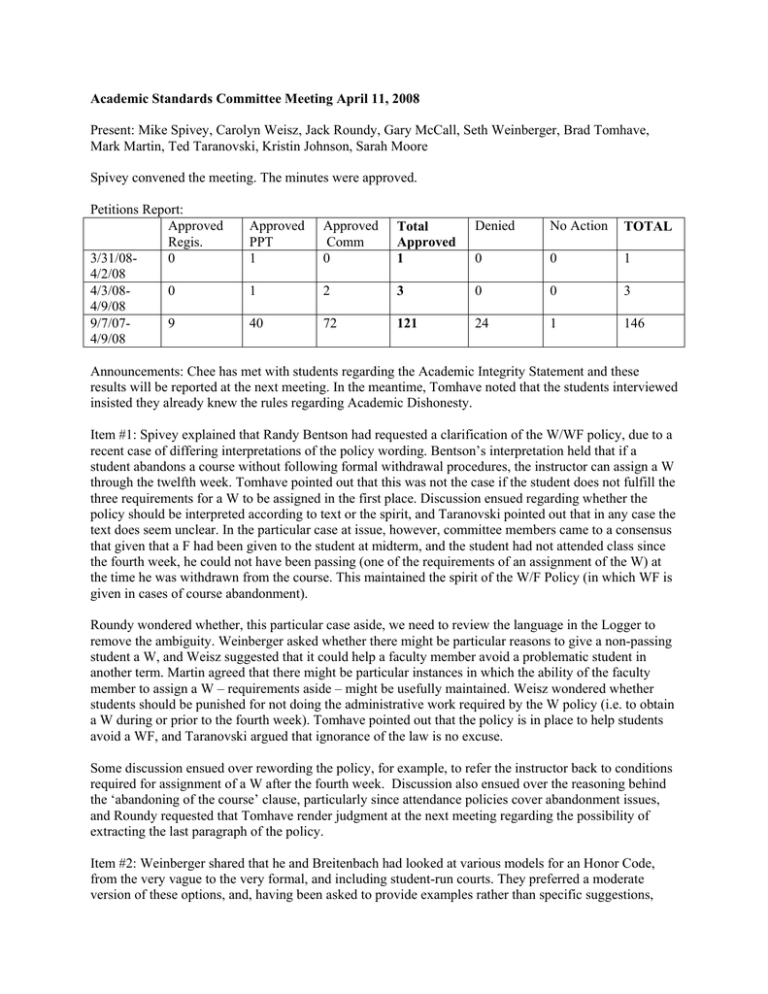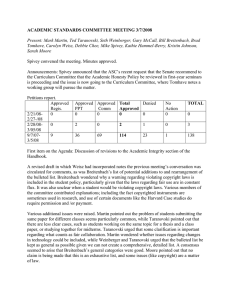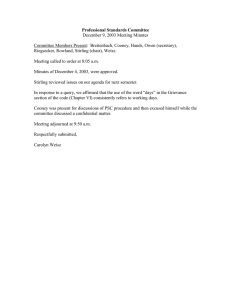Academic Standards Committee Meeting April 11, 2008
advertisement

Academic Standards Committee Meeting April 11, 2008 Present: Mike Spivey, Carolyn Weisz, Jack Roundy, Gary McCall, Seth Weinberger, Brad Tomhave, Mark Martin, Ted Taranovski, Kristin Johnson, Sarah Moore Spivey convened the meeting. The minutes were approved. Petitions Report: Approved Regis. 3/31/080 4/2/08 4/3/080 4/9/08 9/7/079 4/9/08 Approved PPT 1 Approved Comm 0 Total Approved 1 Denied No Action TOTAL 0 0 1 1 2 3 0 0 3 40 72 121 24 1 146 Announcements: Chee has met with students regarding the Academic Integrity Statement and these results will be reported at the next meeting. In the meantime, Tomhave noted that the students interviewed insisted they already knew the rules regarding Academic Dishonesty. Item #1: Spivey explained that Randy Bentson had requested a clarification of the W/WF policy, due to a recent case of differing interpretations of the policy wording. Bentson’s interpretation held that if a student abandons a course without following formal withdrawal procedures, the instructor can assign a W through the twelfth week. Tomhave pointed out that this was not the case if the student does not fulfill the three requirements for a W to be assigned in the first place. Discussion ensued regarding whether the policy should be interpreted according to text or the spirit, and Taranovski pointed out that in any case the text does seem unclear. In the particular case at issue, however, committee members came to a consensus that given that a F had been given to the student at midterm, and the student had not attended class since the fourth week, he could not have been passing (one of the requirements of an assignment of the W) at the time he was withdrawn from the course. This maintained the spirit of the W/F Policy (in which WF is given in cases of course abandonment). Roundy wondered whether, this particular case aside, we need to review the language in the Logger to remove the ambiguity. Weinberger asked whether there might be particular reasons to give a non-passing student a W, and Weisz suggested that it could help a faculty member avoid a problematic student in another term. Martin agreed that there might be particular instances in which the ability of the faculty member to assign a W – requirements aside – might be usefully maintained. Weisz wondered whether students should be punished for not doing the administrative work required by the W policy (i.e. to obtain a W during or prior to the fourth week). Tomhave pointed out that the policy is in place to help students avoid a WF, and Taranovski argued that ignorance of the law is no excuse. Some discussion ensued over rewording the policy, for example, to refer the instructor back to conditions required for assignment of a W after the fourth week. Discussion also ensued over the reasoning behind the ‘abandoning of the course’ clause, particularly since attendance policies cover abandonment issues, and Roundy requested that Tomhave render judgment at the next meeting regarding the possibility of extracting the last paragraph of the policy. Item #2: Weinberger shared that he and Breitenbach had looked at various models for an Honor Code, from the very vague to the very formal, and including student-run courts. They preferred a moderate version of these options, and, having been asked to provide examples rather than specific suggestions, compiled a combination of honor codes from other universities for distribution to the committee. He pointed out some of the commonalities in the codes, including reference to community membership, integrity, formal acceptance of the code, etc. He noted that Chee recommends that the latter take place at matriculation, with a formal signing ceremony. McCall argued – to agreement - that upper classmen should definitely play a role in introducing the Code to students. In doing so he drew on the example of Reed, where the Honor Code is student-generated and enforced. Roundy suggested that the ASUPS president could read the Code to the student body. Weinberger noted that he and Breitenbach leaned away from the idea of student enforcement. Weisz pointed out that while a ceremony during convocation would be an important symbolic step, in order to affect behavior something more repetitive is needed, for example a pledge on Cascade during registration. The committee agreed that a range of reinforcing approaches is needed. Martin shared that he has students sign their work, and emphasizes explicitly to them that in doing so they are pledging that it is their work. Weisz asked what the relation is between the Honor Code and the Academic Integrity Code, and Weinberger replied that the HC would refer to the AIC. Roundy pointed out that pledging to the Honor Code would also be a pledge to the AIC as well as more general community standards. Students do make a pledge during Convocation, and to include the AIC in that we should involve Student Life. Weisz and Weinberger agreed that a short, sweet pledge could be linked to the Academic Handbook. In its language one could include general statements that encompass the spirit of the other codes. Moore pointed out that we need both student feedback on the issue, and a way to encourage student responsibility in order to complete the difficult job of inspiring change. Taranovski suggested someone draft a preliminary proposal to send to Student Life, the Student Senate and the ASC. Perhaps a joint session would even be in order. Weisz suggested that Weinberger and Breitenbach create a draft statement that is short and would permit specific conversation about wording. Weisz suggested that the university’s mission statement might provide helpful language, and also suggested that diversity be included. Taranovski expressed a preference for more general moral statements rather than a list of specifics. Item #3: The ASC will move next to committee self-assessment, and Spivey requested that members send feedback as preparation for this task. Spivey adjourned the meeting. Respectfully submitted, Kristin Johnson

